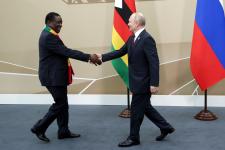Zimbabwe shows why the West cannot win democratic dominance through sanctions and isolation

With another election yielding disputed and discredited results, Zimbabwe is poised to endure another 5 years under the rule of Zanu PF, extending its dominion since 1980. The elections have been discredited by EU observers, who cite a “climate of fear”, and the regional economic organization Southern Development African Community (SADC) argued that "The election fell short of the requirements of Zimbabwe's constitution, the Electoral Act, and the SADC principles and guidelines governing democratic elections”
Several irregularities have been mentioned. In urban areas, which are typically strongholds for the opposition, ballot papers did not arrive on time, prompting an extension of the election by one day. In rural areas, voters were required to provide their details at Zanu PF desks before casting their votes. Given the history of election violence and intimidation, critics argue that this amounts to voter intimidation and hardly aligns with the principles of free, fair, and credible elections.
For those who cast their votes for the opposition, 2028 is very far, especially without a positive shift in the country's economic prospects. The brunt of the hardship falls not upon the political elite, but upon ordinary Zimbabweans. It thus does not help if the international community continue to isolate the nation and perpetuate its pariah state. This will only further inflict pain not upon the elite, but upon the impoverished. In an increasingly multipolar world, Zimbabwe increasingly has room to fortify its alliances with China, Russia, Belarus, and potentially even gain an invitation to join the powerful China-led alliance BRICS.
Zimbabwe will work with available and willing development partners
In a widely circulated interview, the liberation icon and Nobel Peace Prize winner Nelson Mandela once said, "One of the mistakes that people make is to think that their enemies should be our enemies… Our attitude towards any country is determined by that country's attitude towards our struggle." This statement was in reference to South Africa's fight against apartheid. But parallels can be drawn to the current development struggles in the Global South and in Zimbabwe and the West’s mistake of thinking that since China is seen as the enemy in the West the same is the case in the global south.
In 2003, Mugabe adopted the "Look East" policy and forged new development partnerships with countries like China, Malaysia, Singapore. Additionally, he strengthened Zimbabwe's ties with the Middle East, Russia, and other Eastern European countries such as Belarus. Faced with heavy sanctions, Zimbabwean leaders had to make the best of their situation. Abundant minerals continue to be harnessed for economic development, albeit with the flaws and problems this approach can entail. China has especially proven to be a keen and strategic partner, currently holding a significant role in lithium mining in Zimbabwe.
For instance, China has replaced Zimbabwe's colonial-era parliament building with a new, modern, and well-equipped structure worth around US200 million. Additionally, Zimbabwe boasts the distinction of hosting the first a lithium processing plant also built by the Chinese. China's contributions extend further, encompassing road construction, hydropower generation, and more. In China, the adage "If you want to be wealthy, build roads first" holds sway, and it appears this same principle has guided China's engagement in Zimbabwe.
These actions surpass mere symbolic gestures; they are profoundly pragmatic. As politicians occupy their seats in the newly built parliament, and as Zimbabweans secure employment opportunities within these facilities, the rhetoric of former colonizers delivering lectures on democracy, human rights and the importance of the free market takes on even a hollower tone. In the case of the former colonizers, their discourse on human rights only commences in 1980, conveniently omitting a century of atrocities and injustices endured by Zimbabweans under white minority colonial rule. The fact that most senior citizens vote for the Zanu-PF should not be surprising given what they suffered under white minority rule.
No footing for colonial-style relationships
The sanctions imposed on Zimbabwe in the early 2000s have only worsened conditions for ordinary Zimbabweans and have not led to improved democratic conditions in the country. Zimbabwe's story serves as a clear example of the impact of isolation and sanctions. It is okay for any country to express a lack of interest in business opportunities in Zimbabwe rather than recycle typical narrative concerning Zimbabwe's imperfect democracy or human rights record.
The era of colonial-style relationships undeniably finds no footing in the contemporary world. The growing assertiveness of the African leaders points towards a new multipolar world where BRICS will gain more ground. This growing assertiveness is poised to reshape the international monetary system, offering an array of development finance alternatives for Global South nations.
However, this doesn't negate the imperative for nations to uphold mutual accountability. The report from SADC clearly underscores that electoral fraud and human rights transgressions cannot go unchallenged on the African continent and the international community is welcome to join the conversation and put their support in these areas.
Going forward
Moving ahead, significant local efforts must be undertaken as Zimbabwe's development cannot solely depend on global generosity. Can ZANU PF genuinely promote a developmental ideology with potential to benefit beyond the elite? Both old and new partnerships will continue to be crucial for Zimbabwe as a landlocked nation. While Zimbabwe is open to engaging any willing and capable development partner, the responsibility still lies with its leaders to ensure that agreements are advantageous not only for the elite, but for the entire nation.
If natural resources form the backbone of the Zimbabwean economy, the allocation of mining rights and the nature of the deals assume significant importance. Otherwise, Zimbabwe will just repeat the extractive economy that was present during colonialism where valuable resources were extracted to benefit the metropole state – but with new partners e.g. China instead of the former colonies.
With the opacity surrounding these deals, it's probable that the advantages of mineral resources will primarily accrue to a select few within the upper echelons of power. The big question for Zimbabwe is whether the Sino-Zimbabwe relations have been beneficial for the country. Being pragmatic partner has not yet meant that poor Zimbabweans have and will benefit. It is highly tempting for elite level deals to be signed, especially in the natural resource sector where illicit financial flows, tax evasion and corruption can thrive.
If the West decides to continue sanctioning Zimbabwe and leave it isolated, let their actions be based on grounds other than its imperfect democracy and human rights record. These issues are the reasons Western countries should engage with Zimbabwean leaders in the first place and encourage them in the right direction. The conditionalities that the West has imposed on Zimbabwe and other countries have not led to better performance in either democracy or economic development. For the sake of the many Zimbabweans who stand to suffer under punitive sanctions, international isolation, and local political and economic challenges, it is perhaps time to engage more with the Zimbabwean leaders.
DIIS Eksperter
